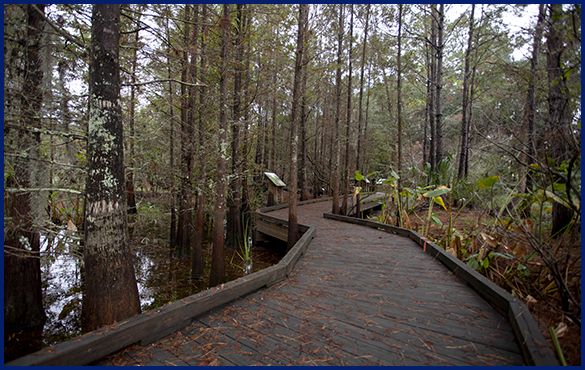Facilities
Gainesville faculty, staff and students are housed in a state-of-the-art facility, constructed in 1990, that was named Steinmetz Hall in 2011. Steinmetz Hall is located on the southwest corner of the University of Florida campus. Because it is on the edge of campus, our department is relatively easy to access, and parking is rarely a problem. We have a beautiful, spacious building with a courtyard that has a fountain, butterfly garden, and lunch area. We have classrooms of various sizes, equipped to send and receive distance education course material, and three large, well-equipped teaching laboratories.
Steinmetz Hall is comprised of two buildings: a smaller administrative and support building of 6,000 square feet and a larger building for faculty offices and labs (82,000 square feet). Behind Steinmetz Hall is a separate urban entomology building and plant propagation space. Our department has 19 greenhouses immediately behind Steinmetz Hall as well as research support buildings, such as pesticide storage (300 square feet), headhouse/storage and a workshop (1,500 square feet), and shadehouses (1,800 square feet). A 2,400-square-foot nematology field laboratory and 3,000-square-foot dedicated greenhouse space is nearby. In addition, our department maintains a bee biology field laboratory with 1,650 square feet of laboratory space and ample room for apiaries.
As part of our Extension mission, we maintain two identification service laboratories. The Nematode Assay Lab will determine the types and numbers of plant-parasitic nematodes in soil and plant samples for a modest fee. The Insect Identification Lab serves as the hub entomology component of the Southern Plant Diagnostic Network Regional Center and the Florida Plant Diagnostic Network. The lab manager provides or arranges for identification of any insect or related arthropod for a small fee.

The Natural Area Teaching Lab is managed by members of our faculty and faculty from six different colleges on campus. This 66-acre tract of undeveloped land is maintained in its natural state with native vegetation. It is used extensively as an outdoor laboratory for many of the classes, research and outreach activities of our department. Additionally, it gets used by other groups such as various UF classes from other departments and colleges, 4-H programs, schools, and clubs. It is also a great place for our faculty, staff and students to have a picnic or walk and unwind.
About 40 of our department’s 70 faculty are stationed at 11 UF/IFAS Research and Education Centers located throughout the state, rather than at the main campus in Gainesville. This provides an exceptional opportunity for students to work in diverse ecosystems and crop-production environments.
A short drive south of Gainesville is the Plant Science Research and Education Unit (PSREU). This over-1,000-acre research farm is the primary urban landscape and agriculture research facility used by most of our on-campus faculty. It has facilities for conducting research with everything from strawberries to citrus, turfgrass to tomatoes, and olives to bees. It is equipped with all the farm equipment needed to grow and maintain almost anything. The facility includes greenhouses, a mechanic shop, pesticide and fertilizer storage facilities, dryers, and freezers. There are also storage, lab and office spaces available for faculty use. The PSREU has a conference center and classrooms used by our faculty for teaching and Extension.
Emerging Pathogens Institute (EPI) was founded in 2006 and focuses on the health of humans, animals, plants and the environment. Certain members of our Entomology and Nematology faculty are located at the EPI. By capitalizing on the University of Florida’s existing resources to bring together diverse research in the fight against diseases, researchers at the EPI fuse key disciplines, including entomology, to develop research capabilities designed to preserve Florida’s health and economy, and to prevent or contain new and reemerging diseases. Within the Cancer/Genetics building housing EPI is the Interdisciplinary Center for Biotechnology Research. This facility provides all necessary services for molecular biology research, including bioinformatics, electron microscopy, NextGen DNA and Sanger sequencing, proteomics and mass spectrometry, gene expression and genotyping, cytometry and monoclonal antibody development.
The McGuire Center for Lepidoptera and Biodiversity is part of the Florida Museum of Natural History and is located a block from the department. Some of the McGuire Center entomologists have affiliate appointments in our department; others are courtesy faculty. McGuire Center entomologists serve on graduate committees, lecture, and teach some of our classes. A number of our graduate students are funded by, and work at, the McGuire Center.
In addition to University of Florida faculty, the Gainesville area is home to several other institutions with entomologists and nematologists who interact and collaborate with us. Many of these have graduate faculty status in the department, allowing them to serve on graduate student committees. Alachua County has the largest population of entomologists and nematologists per capita in the United States. The Florida Department of Agriculture and Consumer Services Division of Plant Industries (DPI) Bureau of Entomology, Nematology and Plant Pathology houses a number of regulatory entomologists and nematologists who are important resources for our department. DPI scientists are research collaborators, lend taxonomic expertise in our Extension programs, provide internships to our students, serve on graduate committees, lecture, and sometimes teach classes. Similarly, the USDA-ARS Center for Medical, Agricultural, and Veterinary Entomology is on the UF campus, and their scientists work with our faculty and graduate students on numerous research projects.

